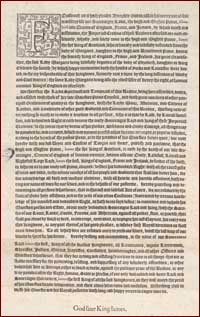James becomes king
On 24 March 1603, Queen Elizabeth of England died. She had always refused to discuss the succession with her court, but most people knew that King James VI of Scotland was the only suitable candidate. Although he was from a country with which England had fought many wars, he was a Protestant, had already been a successful king, and had healthy children to succeed him. Lengthy family trees were compiled to show how James descended from the English houses of York and Lancaster as well as the Scottish Stuarts, and he was proclaimed King James I of England.
Rule from London
The news was quick to travel north, and the English aristocracy hurried to acclaim their new master. James, who had always hoped to hold the English throne, packed his bags. London was the only place for the new ruler of England, Scotland, Ireland and Wales. (Ireland had been under the English crown to varying degrees since the 12th century, and Wales had been politically united with England in 1536.)
James told the disconsolate citizens of Edinburgh that he would return frequently, but it must have been obvious that Scotland was going to lose out. The court, including the leading Scottish poets, moved south. James travelled for the first time across the border and down through England, dispensing honours and money along the way to win the admiration of his new subjects.
Learned sovereign
The English were nervous about the arrival of Scots seeking positions in London, and about James's plans for their country, but there was relief that they had a king again. James's works were republished in England to advertise him to those who could not see him in person. Here was one of the most learned kings ever, who wrote theology and politics, gave eloquent speeches, and knew many languages. Would it, though, be enough to help him be the first ruler of the whole British Isles?



